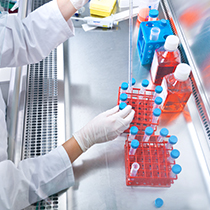Aseptic technique and hygiene in cell culture labs (basics up to GMP) Inhouse-training
Content & Learning ObjectiveThis practical course gives you a comprehensive and clear overview of the importance and implementation of principles of hygiene and aseptic working technique in the cell culture laboratory. In the theory part, the basic ideas, specifications and principles are presented and a system for developing your own specifications is introduced. In the practical part these principles will be implemented within a workshop and sources of errors will be searched and evaluated interactively by the participants themselves. The aim of the course is to motivate the participants to work systematically and thus safely, to avoid contamination in the future and to be able to judge competently which measures are reasonable or unnecessary. The specific content of the course can be scaled from research up to GMP assay laboratories.
|
 |
Topics of the theory seminars
- Cleanroom systems
- Air locks
- Personal protective equipment
- Sterilization and disinfection of reagents and equipment
- Disinfection of surfaces and personal protective equipment
- The operating principle of the laminar air flow cabinet (safety cabinet, bench)
- Derived working principles as a system
- Contamination
- Hygiene and its importance in GMP environment
- Hygiene and its importance for ATMP
- Risk analysis as a basis for decision making
All topics in the standard course are based on the assumption that participants already have a solid knowledge of cell culture and have also already worked with cell cultures. However, if required, the level can also be designed for beginners or people from outside the field. A combination with basic cell culture courses is also possible.
Topics of the practical part
- Workshop: order and positioning in the safety cabinet
- Workshop: handling of special material in the workbench
- Trouble shooting and feedback during the workshops
- The practical part can also be linked to routine methods
The practical part is aimed at finding sources of error during practical execution, identifying potential for improvement, but also dealing more consciously with routine processes, since it is usually the experienced and advanced employees in particular who no longer pay attention to these things.
Frequently combined further topics for in-house courses
This content is adapted, supplemented and shortened for in-house courses according to requirements and customer wishes. Depending on the content, group sizes and available sterile workbenches, the course can be designed between 1 and 4 days long. All content is customized. Additional topics could include:
- Mycoplasma and mycoplasma test kits
- Cross contamination
- Hygiene relevant equipment (e.g. sterile bench, incubator) and their selection, cleaning and testing
- SOP workshop: sterile work technique
- Routine methods
- Cell culture quality management
- Cell counting and counters
- Standardization
- Bioassays
Target group
This course is tailored for laboratory personnel from research, bioassays or pharmaceutical production who already work with cell cultures or are to be trained. Basics of pipetting etc. are only taught insofar as they have a direct influence on sterility. Experience at the sterile bench is expected unless the complete training is tailored for beginners. If complete newcomers are to be trained, the seminar and the practical part can be adapted accordingly. The course can also be shifted to GMP level (quality control or production levels).
Duration of the course
The standard duration is 1 day if 8 persons are trained and 2 large sterile benches (1,8 m) are available.
Depending on customer specifications, the course can be tailored to 1 to 4 days. The course can also be booked as a theory seminar. For longer courses, acute problems or laboratory-specific methods can be worked on as a workshop to achieve more intensive trouble shooting. SOPs, forms or other guided documents can be discussed, controlled and improved on the basis of a non-disclosure agreement. The practical part of the training can be tailored to the assays or production steps you are performing, allowing sources of error to be analyzed together and quickly. We will discuss your special wishes and requirements in advance in an informal and non-binding telephone call. You can find our contact details here.
Dates and Prices
For in-house trainings please contact us by mail or phone, afterwards we will make you an individual offer, which depends on the content and duration of the in-house course. Already from 4-5 participants an in-house course is more favorable than the individual training of your employees by participation in open advanced trainings. Of course, we will discuss the date of the training with you. Generally, a course can be held within 4-8 weeks after the initial contact with you. We will discuss your special wishes and requirements in advance in an informal and non-binding telephone conversation.You can find our contact details here.
The course fee for in-house trainings includes the training materials in color print, a certificate of attendance, and the instructor's travel and hotel expenses.
Advantages of in-house trainings
- From 4-5 participants an in-house training is cheaper
- Your employees do not have to travel
- The training concept is individually designed for you and adapted to your goals and employees.
- In practical trainings your assay can be performed in the course, this helps with trouble shooting
- All employees of your department are actively involved in the development of new standards. This increases compliance
- The practical parts take place in your laboratories and all results are directly transferable
- Suggestions for optimization are thus also possible for rooms and processes
Trainer
|
Dr. Nicole Kühl studied Biology at the Technical University of Karlsruhe and the University of Bremen. 1999 she completed her Ph.D. in cell and molecular biology studying the cell cycle and heat shock proteins. Dr. Kühl then began her post-doctorate work at the Academic Hospital Groningen in the Netherlands, where she specialized in research related to multiple sclerosis and worked with primary glial cells. In 2005, she continued her work at the Jacobs University Bremen, where she led a research group and lectured in biochemistry and cell biology. From 2008 to 2011, Dr. Kühl was the head of the PromoCell Academy and taught cell culture as well as quality assurance and GMP courses. Since 2012, she is a freelance trainer and consultant in the area of cell culture quality assurance and GMP and runs the cell culture web site InCelligence.de. Watch Dr. Kühl in a video from our MOOC. Dr. Kühl also works as a consultant for manufacturers of e.g. incubators, cell culture plastic consumables, cell counter and analyzers. Since 2016 Dr. Kühl acts as an external head of quality assurance for ANOVA IRM GmbH. There she acquired two legal permissions from the German regulatory bodies, one for a tissue preparation and one for an ATMP. |
 |


